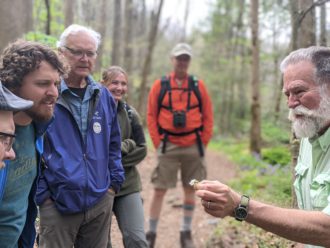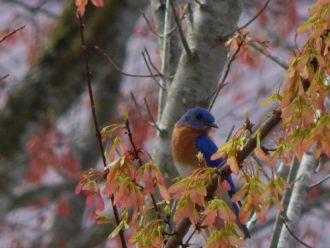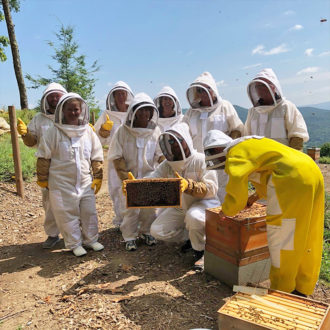Testing conducted by local conservation organization MountainTrue identified cattle and faulty or inadequate sewer, septic or water treatment infrastructure as the major sources of E. coli pollution in the French Broad River.
MountainTrue’s French Broad Riverkeeper conducts regular water quality monitoring of rivers and streams throughout the French Broad River Basin, including weekly testing of more than 30 recreation areas from May to September. After decades of slow but consistent improvement to the basin’s water quality, the organization has documented a sharp decline in water quality.
“The difference over that past few years has been disturbing,” explains French Broad Riverkeeper Hartwell Carson. “Take Pearson Bridge in Asheville’s River Arts District: That site passed the EPA’s safe threshold for swimming 81% of the time in 2016. Just four years later, that site failed 81% of the time in 2020. Or Mud Creek in Henderson County; that site passed 52% of the time in 2018, and now it fails 93% of our tests.”
MountainTrue’s standard E. coli testing program measures the E. coli in the river. Levels in the French Broad have been high and rising year-over-year, but the nonprofit couldn’t say for certain what the sources of the pollution were. Determining the major sources of E. coli required more expensive testing to look at the presence of DNA in the river.
The nonprofit says it approached Sen. Chuck Edwards, whose district includes Henderson and parts of Buncombe County, for help securing state funding to pay for sampling and lab costs. With that funding, MountainTrue looked at the DNA found in 55 water samples to look for genetic fingerprints of E. coli from people, cows, dogs, poultry, sheep and swine.
Of the 55 samples, 44 revealed DNA from cows. Human DNA was the second-most prevalent. The results vary, but at nearly every site the primary sources of pollution were cattle followed by human. Dog DNA also showed up as a moderate contributor to E. coli pollution at a few sample sites.
“The French Broad has some clean and clear streams that run through protected public lands, but we’re seeing more and more problem sites that consistently fail the EPA’s safe water standard for E. coli,” says Carson. “Until now, we’ve only had educated guesses about where the E. coli was coming from. With this testing, we have the data we need to make more informed decisions about how to clean up our rivers.”
MountainTrue encourages the public to advocate for the adoption of a clean rivers policy agenda that includes funding to help farmers, property owners and local governments reduce water pollution.
The public can read about issues affecting water quality, and the policies and reforms MountainTrue says are needed to fix them at iloverivers.org.
Get outside
-

WALK AMONG THE WILDFLOWERS: Asheville Hiking Tours is offering wildflower and birding walks guided by experts Scott Dean and Bill Sanderson. Here, Dean enthralls guests with jokes and stories about spring ephemerals. Photo by Jenny Gruhn, courtesy of Asheville Hiking Tours Starting Friday, April 23, Asheville Hiking Tours will offer wildflower and birding walks guided by wildflower authority Scott Dean and wildlife biologist and birding expert Bill Sanderson. Guided wildflower or birding walks are $20 using the promo code OUTSIDE2021. Information and reservations are available at AshevilleHikingTours.com or 828-476-8687.
- Join a volunteer workday at the George Washington Carver Park (30 George Washington Carver Ave.) 2-5 p.m. Friday, April 23, or 2-5 p.m. Friday, April 30, at the Tempie Avery Montford Edible Park (34 Pearson Drive). Both parks grow fruits and nuts, the result of many years of community stewardship.
- Bountiful Cities will also host two community garden work days at Pearson Garden in Montford (408 Pearson Drive) on Sunday, April 25 and Monday, April 26. Volunteers can sign up at avl.mx/99t.
- Killer Bees Honey Farm is resuming its four-hour apiary tours beginning Friday, May 7. The 75-acre apiary in Lake Toxaway is deemed a wildlife refuge under the N.C. Wildlife Conservation Lands program.
Making Asheville bird-safe
To reduce the number of birds that die each year as the result of window collisions, the Coalition for a Bird-friendly Asheville is advocating for bird-safe window treatments and a lights-out commitment during migration months.
The coalition is made up of students at UNC Asheville, members of the Blue Ridge Audubon chapter and Audubon North Carolina. The group’s website at birdsafeavl.org outlines strategies and products for reducing bird-window collisions. Incident data on collisions can be submitted via a form at avl.mx/prvu to aid in the organization’s advocacy and mitigation efforts.
New face in town
Tracy Swartout is the new superintendent of the Blue Ridge Parkway. The South Carolina native is a 21-year veteran of the National Park Service, serving most recently as the deputy superintendent at Mount Rainier National Park in Washington.
“Throughout my life, the Blue Ridge Parkway has played a prominent role, with some of my most treasured memories being shaped along that winding road and in the national parks and communities beyond,” Swartout said in a press release. “The area’s landscape, arts, music and culture are deeply meaningful for me. I am honored to join the talented park team and dedicated network of community and nonprofit partners to serve in this critical leadership role.”
Did you know?
- Asheville City Council named a newly completed 3.5-mile section of greenway in the River Arts District the Wilma Dykeman Greenway in honor of the late environmentalist, author and historian. Located on the east bank of the French Broad River between Broadway and Amboy Road, the section initially was called the French Broad River East Bank Greenway. The new name recognizes Dykeman’s contributions, as well as better distinguishes the east and west sides of the greenway that run along the French Broad River.
- April is Food Waste Reduction Month, and the city of Asheville is sponsoring a home food waste challenge on social media using the #AVLFoodWasteChallenge hashtag. More information is available at avl.mx/99j.
- The N.C. Apple Growers Association launched a new website at ncapplegrowers.com.
- Pup-rearing season for bats officially begins on Saturday, May 1, and the N.C. Wildlife Resources Commission encourages those who believe they have bats in their homes to practice responsible relocation. If unable to remove bats from a home before rearing season begins, NCWRC recommends leaving the bats undisturbed until the end of July. For more information, visit avl.mx/99n.
- Asheville-based landscape architecture firm Equinox Environmental has entered a contract to design the Woodfin Whitewater Wave and Riverside Park expansion. The design process will take approximately 10 months to complete and cost roughly $719,120.
- The Blue Ridge National Heritage Area Partnership has awarded $185,000 in grants to fund projects in Western North Carolina, including $16,000 to the Eastern Band of Cherokee Indians’ Department of Natural Resources to develop a master plan for a tribal eagle aviary to protect rescued birds, provide shed feathers for ceremonial activities and present educational activities. More information on the grantees can be found at avl.mx/99q.
- U.S. Cellular is offering customers up to $500 for the return of old cell phones and wireless devices for safe recycling. In 2020, the company’s Trade-In and Recycling program diverted 99,000 pounds of electronic waste from landfills and avoided more than 280 million gallons of water pollution.
Photo contest encourages great habitats

Conserving Carolina’s 2021 Habitat at Home photo contest kicked off April 1 and runs through Saturday, May 15. The local conservation nonprofit is looking for photos or videos that show any of these three things: 1. native plants in gardens or landscaping; 2. projects to improve habitat; 3. wildlife (of any size) seen at or near home.
To enter, create a public post of a photo or video on Facebook or Instagram with the hashtag #habitatathome2021. Entries may also be submitted by email to rose@conservingcarolina.org. A judging panel will select five finalists, and the contest winner will be chosen through online voting. The finalists and the winner will win garden-themed prizes.
Complete contest rules and information are available at avl.mx/99i.
Need seeds?
Dreaming of a garden makeover? Conserving Carolina, True Ridge and Tierra Fértil Collective are offering a free community seed swap throughout April.
Community members can visit True Ridge’s office, 110 Edney St., Hendersonville weekdays 9 a.m.-3 p.m. to pick up free seed packets. Empty seed packets are also available on-site for growers to drop off excess locally saved and store-bought seeds, as well as native plants, flowers and food sources.
For more information, visit avl.mx/99l.
Good, green jobs
Local nonprofits Green Opportunities and the YMI Cultural Center’s Operation Gateway are offering a three-week paid training program to prepare members of marginalized communities to succeed in living-wage trade jobs, including solar installation.
The groups are partnering with solar installer SolFarm Solar Co. and TP Howard’s Plumbing to teach participants soft skills like leadership and accountability, followed by two weeks of on-the-job training with plumbing or solar crews. The program runs Monday, April 26, through Friday, May 14; companies have the option of hiring participants as full-time employees at the end of the training period. For more information, visit avl.mx/99o.




Before you comment
The comments section is here to provide a platform for civil dialogue on the issues we face together as a local community. Xpress is committed to offering this platform for all voices, but when the tone of the discussion gets nasty or strays off topic, we believe many people choose not to participate. Xpress editors are determined to moderate comments to ensure a constructive interchange is maintained. All comments judged not to be in keeping with the spirit of civil discourse will be removed and repeat violators will be banned. See here for our terms of service. Thank you for being part of this effort to promote respectful discussion.